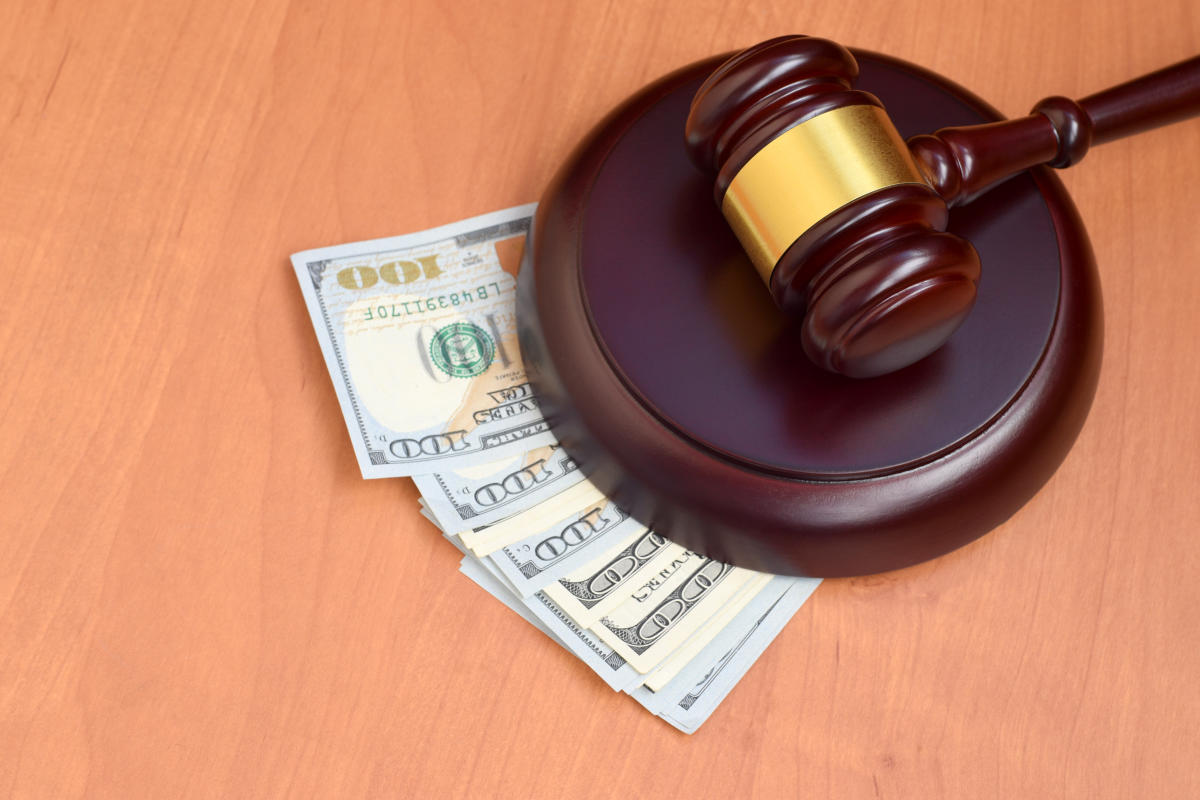How Much Does a Car Accident Lawsuit Cost?

What does it actually cost to file a lawsuit after a car accident? This guide reviews the continuing costs of a car accident lawsuit and what you should know when speaking with an attorney about how to balance the cost of your case with your potential gain.
What to Expect
Filing a lawsuit costs more than you might realize, so you need to determine whether it’s worth it based on what you’ll get in return. It can cost thousands of dollars to file your lawsuit by the time you pay your lawyer and all the other fees associated with your case. Here is a breakdown of what you can expect and take into account before you decide to proceed.
Billing Schedules and Legal Fees
There are a ton of legal fees that you may not be aware of when pursuing a lawsuit. Everyone’s aware that they need to pay their attorney, but how you pay a lawyer depends on the arrangement you agree to before retaining them. There might be a retainer fee you need to pay upfront and depending on whether your attorney receives payment on contingency or not, you could need to pay an hourly rate.
This is just the tip of the iceberg, however. Lawsuits cost courts money to litigate, and you’re required to pay fees for depositions, discovery, expert witness testimony, filing the lawsuit and court costs. Let’s break down a few of these costs.
Hiring on Contingency
Hiring on contingency means the client and lawyer have agreed to a contingency fee agreement. The lawyer agrees to represent the client under the condition that the lawyer may only collect a fee if the case is resolved in favor of the client, meaning they receive a fee deducted directly from the accident settlement amount. This way, the lawyer’s fee is contingent on the outcome of the case.
Only plaintiffs, or clients filing the lawsuit and seeking compensation from the defendant or at-fault driver, may generally hire a lawyer on contingency. In some cases, defendants may be able to get a contingency fee agreement if the parties disagree over who's liable for the damages or injuries resulting from a car accident.
Plaintiffs can seek compensation for damages such as:
Lost wages and medical bills
Pain and suffering
Punitive damages
Pros
One of the main advantages of hiring on contingency is that you’re not responsible for paying your lawyer should you lose the case. Many claimants are dealing with medical bills or lost work and may be struggling financially as a result, making it difficult to afford up-front legal fees. A contingency fee agreement can help them afford professional legal services.
Your lawyer doesn’t get paid unless you do, which can help incentivize their hard work on your case. If you win, they’ll be paid according to the contingency fee agreement regardless of how much or how little they work.
Cons
The downside to hiring on contingency is that it could cost you more than standard rates if the case is resolved quickly. Lawyers may also negotiate a higher fee if your case is risky or avoid taking your case altogether if it seems unlikely to be successful or won’t result in lump sum monetary compensation.
Although you won’t pay your lawyer unless you win your case, you may be responsible for disbursement fees such as medical reports, filing fees and other administrative costs.
Hiring on Retainer
When you hire a lawyer on retainer, you form a retainer agreement that stipulates the money you’re required to pay to secure the lawyer’s services for a general time period or specific case. These agreements are often used by both claimants and defendants in car accidents and personal injury cases.
You’ll provide a deposit in advance for legal fees and expenses incurred by the lawyer on your behalf, which is called a retainer fee. Each time the lawyer performs work for you, you’ll receive a bill for their services. Payment is taken from the retainer fee deposit.
Pros
Hiring a lawyer on retainer guarantees your access to your preferred legal representation. You can also determine specific hours or services you want access to, as well as the scope of representation. The up-front costs of a retainer agreement can also help in budgeting short- and long-term expenses based on the complexity and duration of your case.
In turn, a retainer fee ensures an income stream for lawyers. They may be more likely to take on riskier or more complex cases in return for guaranteed payment.
Cons
Clients with limited financial resources may not be able to afford costly retainer fees and as such may seek out less expensive lawyers who may lack specialized experience or knowledge. Less qualified lawyers may cost less but can weaken their client’s case.
Most retainer agreements return unused retainer fees, but certain agreements don’t require that unused fees be returned to the client. Cases can sometimes become more complex and require more time and financial resources to resolve. The initial retainer fee may not be enough, and you may need to continue paying expensive fees to pursue the case.
How to Read a Retainer & Contingency Agreement
Before the lawyer begins working on your case, you’ll formalize your agreement with either a retainer or contingency contract. This contract covers aspects such as fees, terms of the lawyer-client relationship, the scope of representation and breach of contract consequences.
Understanding Legal Fee Schedules
Retainer and contingency agreements describe lawyers fees and how they're calculated and charged. For the contingency fee, the fee schedule describes what percentage of the net settlement the client owes to the lawyer, whether they’ll be paid in a lump sum or in installments and other conditions.
Most lawyers hired on contingency charge between 25% and 40% of their client’s net settlement. The contingency fee may also depend on case circumstances. For example, you may only owe your lawyer a 30% fee if the case is resolved quickly, but they might require 40% if the case goes to trial. Lawyers may also charge percentages according to settlement amounts, such as 30% for an initial $100,000 and 20% for additional settlement amounts.
The retainer agreement describes the retainer fee owed to the lawyer. These fees are based on several factors, such as the experience or expertise level of the lawyer, the case’s complexity and the extent of work required. The agreement also describes how and when the lawyer can access the retainer for fees incurred, as well as additional retainer fees they may request.
Payment Structure
Contingency and retainer fees are based on a few factors and costs. The payment structure should detail exactly what services and fees you’re paying for, including:
Contingency fee
Retainer fee
Fixed fees for specific services
Hourly rates
Disbursements
Taxes
It’s important to look closely at this section of the agreement to avoid fee disputes or unexpected costs.
Fee Agreement Breaches
Retainer and contingency agreements are contracts, so a violation of the agreement is treated as a breach of contract. Generally, the other party is entitled to monetary compensation for damages caused by the other’s breach of contract.
If a lawyer fails to perform work for the client as detailed in the contract, for example, they can be liable for a breach. The client can then seek reimbursement or file a suit against their lawyer.
Assessing Potential Out-of-Pocket Costs
Various disbursements can be expensive and add up quickly. Lawyers pay out of pocket for filing fees, conducting depositions, paying witnesses and other third-party services. In addition to the contingency fee, the lawyer is reimbursed for these costs out of your share of the settlement. For instance, if they’re entitled to a 30% contingency fee of your $100,000 settlement but incurred an additional $20,000 for other costs, they’d actually get $50,000.
State-by-State Regulation on Contingency Fees
State regulations vary on statutory requirements for contingency fee agreements. Most states impose reasonable limits on contingency fee percentages, preventing lawyers from charging clients too much. These limits consider a complex set of factors to determine a fair limit.
Lawyers are responsible for understanding the rules and regulations within the state they practice in, and neglecting to do so can lead to ethical traps. For example, contingency fees are standard in personal injury cases, such as car accident claims. However, state regulations generally prohibit contingent fees for criminal or family law cases.
Other contingency agreement regulations relate to handling disputes and rules of professional conduct. Your state’s bar association can provide further details about regulations.
Court Costs
These fees are collected so that the court can pay the juror pool and for those employed by the court to do their jobs. They could include transcription fees, paying the jury’s daily stipend and obtaining copies of court documents and recorded testimony.
Expert Testimony
One of the ways an attorney can build a stronger case is to have an expert appear before the court to support your claims. For example, if your injuries will require ongoing therapy and medical procedures to treat, you need someone to place a value on the future cost of your care. Expert witnesses don’t take the stand for free though, and cases where multiple experts are called to testify can cost a lot more to litigate.
Discovery and Depositions
The process of discovery is how an attorney builds a case for you. This requires calling witnesses to provide their statements during depositions before the trial even begins. The most significant costs are for your attorney’s time and a stenographer to create transcripts of each deposition.
Administrative Costs
Many people wonder what the difference is between court and administrative expenses. These costs go toward legal research and arguments, travel expenses, postage and composing exhibits to use during the trial. Administrative costs are reduced when the case doesn’t require a long litigation period but can add thousands of dollars to the cost of your lawsuit if the trial is drawn out.
Property Damage Costs
The cost of property damage includes damage to your vehicle and any personal belongings inside during the accident. Insurance companies often assess claims based on the value of a vehicle at the time of the incident, which can make it difficult to replace your vehicle if your claim is devalued due to depreciation. In some cases, the insurance company declares your vehicle totaled and makes an offer based on what it would cost to buy a similar vehicle with the same mileage and age.
What this means for you is that even if the other party’s insurance company pays the claim, you could be left with additional out-of-pocket expenses to replace your car. If you need to rent a vehicle until you can get a new one, these costs become a factor as well.
Medical Needs
Your medical expenses can be broken into two categories. The first is the immediate cost of treatment and includes emergency room and hospital bills. The second is ongoing care, which wouldn’t have been necessary if you weren’t in an accident. Estimating future medical expenses can be difficult and is one reason attorneys seek compensation for pain and suffering. If you’re awarded additional money for your pain and suffering, it can help cover unexpected medical bills.
Will Medical Bills Be Reimbursed?
There are several ways that you can cover your medical expenses. The first is through the other party’s insurance, and the second is through your own. If you have medical insurance or auto coverage that pays for bodily injury, you may be able to file a claim to cover what the at-fault party is unable to pay.
Who Reimburses Medical Costs
In the majority of cases, winning a lawsuit against someone else doesn’t cause that person any true financial loss. Their insurance company pays for the settlement or judgment up to the limits stated in the policy. There are instances where your costs may exceed the policy limit and you need to seek damages from the actual person. However, keep in mind that if someone doesn’t have any money to give, it doesn’t matter if you win a judgment.
Can You Keep Submitting Insurance Claims Related to an Accident?
There are many instances of an insurance claim not being able to cover the true cost of an accident. This could be because it costs more to repair a vehicle than the appraisal or because someone’s medical bills surpassed estimates. One way to address this is through a supplemental claim.
A supplemental claim identifies damage that was not discovered during the initial appraisal. Insurance companies often try to protect themselves with policy exclusions so they don’t need to pay supplemental claims. You also need to consider the policy limits for the other party’s insurance policy and what the maximum payout is per accident.
The Bottom Line
You may not always be able to recover court costs and attorney fees when seeking damages after an accident, but a lawsuit can still cover a lot of your expenses. It’s important to weigh the potential costs versus what you have to gain before you get started.
Expertise.com StaffAuthor
Step into the world of Expertise.com, your go-to hub for credible insights. We don't take accuracy lightly around here. Our squad of expert reviewers, each a maestro in their field, has given the green light to every single article you'll find. From rigorous fact-checking to meticulous evaluations of service providers, we've got it all covered. So feel free to dive in and explore. The information you'll uncover has been stamped with the seal of approval by our top-notch experts.

Kevin JonesReviewer
Kevin Jones is a personal injury lawyer who practices in Missouri, Kansas, and Oregon. In 15 years of practice, he has won record-setting jury verdicts and is routinely recognized with peer-nominated awards.

![Airbag Injuries and Average Settlement Amounts [2023]](https://images.ctfassets.net/k00sbju4hbzq/3BBaoZsvlj0NDySlMekb5V/aae10f65f969b6faf29ccfbee387c4d4/Depositphotos_61460709_XL.jpg?fit=fill&w=384&q=75)
![Average Car Accident Settlements [2023]](https://images.ctfassets.net/k00sbju4hbzq/4BBkDDWAQT0dL8I9OSMFnt/36439fec4b6260a58e0c384f64809566/Depositphotos_335949804_XL.jpg?fit=fill&w=384&q=75)
![Can I File a Lawsuit if the Car Accident Was My Fault? [2023] DUP IMAGE](https://images.ctfassets.net/k00sbju4hbzq/KjM0u9gm0nmPN9Agv7fih/5a7d1f7c763eada5c66e5547e6e487e1/Depositphotos_341258876_XL.jpg?fit=fill&w=384&q=75)
